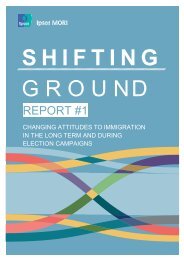You also want an ePaper? Increase the reach of your titles
YUMPU automatically turns print PDFs into web optimized ePapers that Google loves.
Ties <strong>that</strong> Bind<br />
107 Ibid.<br />
108 Supplementary Letters<br />
forwarded by the Censor, Indian<br />
Mails in France, 4th December<br />
1915, Censor of Indian Mails,<br />
1914-1918, L/MIL/5/828/91, IOR,<br />
BL, London<br />
109 The Comrade, 7 November<br />
1914, Centre for South Asian<br />
Studies, Cambridge<br />
<strong>11</strong>0 Ibid.<br />
<strong>11</strong>1 The Choice of the Turks,<br />
reproduced in, Indian Muslims: A<br />
Documentary Record, edited by<br />
Shan Mohammad (Meerut, 1982)<br />
p.14<br />
<strong>11</strong>2 L/PS/10/518, file 4947/1914,<br />
IOR, BL, London<br />
<strong>11</strong>3 The war: Muslim feeling;<br />
expressions of loyalty,<br />
L/PS/10/518, p.6, IOR, BL, London<br />
32 | policyexchange.org.uk<br />
To our brothers, the Indian Muslim soldiers. The time has now arrived. Come to our aid. Let us<br />
crush the enemies of our Caliphate and of our capital, namely the powers of the Entente. We<br />
are ready. We are waiting for you, our brothers. 107<br />
These appeals failed to stir widespread passion among Muslim <strong>sep</strong>oys. A report by<br />
mail censors on the Western Front concluded <strong>that</strong>, ‘in the circumstances it is really<br />
surprising <strong>that</strong> so few men should have yielded to the temptation’ and <strong>that</strong>, ‘as yet<br />
the enemy’s brand of Pan-islamic [sic] propaganda has found small success<br />
amongst the Indian Musalmans and the behaviour of the Indian troops in France<br />
very<br />
strikingly illustrates the same thing’. 108<br />
The same was true back in India. Although Indian Muslims had supported the<br />
Caliph in his spiritual capacity and his claim to authority over Islam’s holy sites<br />
in Makkah and Madinah, the popular leader Mahomed Ali immediately distanced<br />
himself from the fatwa for jihad. Yet Ali was not reflexively pro-British. He had<br />
previously supported Ottoman causes such as the Indian Red Crescent Society in<br />
19<strong>11</strong>, which supplied medical aid to civilians affected by the Italian-Ottoman war<br />
over Tripoli. However, the call to jihad by the Ottoman government was a step too<br />
far. He argued <strong>that</strong> ‘whatever the Turkish case may be in the present crisis, the<br />
Indian Mussalmans are fully aware <strong>that</strong> it does not bear any religious<br />
character…The Sultan in his capacity of the servant of the sacred places, is not<br />
required to inflect his temporal interests, and we emphasise this because when he<br />
believes, whether rightly or wrongly, <strong>that</strong> his temporal interests require him to act<br />
in a particular manner, he must not expect <strong>that</strong> our temporal interests will<br />
invariably require us to act in the same manner…our temporal interests may<br />
differ and in this case the Turks must pursue their interests and leave us to pursue<br />
our own’. 109<br />
Mahomed Ali made it clear <strong>that</strong> while he accepted the Caliph’s authority over<br />
spiritual matters, this war was a worldly affair. Although he empathised with the<br />
plight of the Ottomans, he did not regard the Caliph as a universal political ruler<br />
of all Muslims. ‘As long as the holy places of Islam are free from hostile menace<br />
[in the Arabian Peninsula] and the principle of the absolute and free Islamic<br />
protection over them remains intact, no Mussalman in India would shrink from<br />
any sacrifices <strong>that</strong> he may be called upon to undergo in the best interests of his<br />
country’, he explained. <strong>11</strong>0 Ali later reasserted these views in a now famous article,<br />
‘The Choice of the Turks’, where, despite expressing sympathy for the Ottoman<br />
government which had been treated badly by European powers prior to 1914, he<br />
explained they had still been wrong to side with Germany. <strong>11</strong>1 Crucially, his views<br />
were endorsed by the important Sufi cleric Maulana Abdul Bari, who later<br />
encouraged a number of other leading ulema to also give pledges of allegiance to<br />
the British government – after convening a meeting in Delhi. <strong>11</strong>2 Similar pledges<br />
followed meetings in Budaun, Mahrera, Sultanpur and Bulandshahr, along with<br />
statements expressing condemnation of Ottoman activity. <strong>11</strong>3<br />
The essential point here is <strong>that</strong> Indian Muslim leaders were objective and<br />
dispassionate, employing reason to reconcile the difficult circumstances in which<br />
they found themselves. They used their influence to impress the need for fairness<br />
on their congregations. For example, during a town hall meeting in Bankipore –<br />
a typical method of conveying political sentiment to disparate communi<strong>ties</strong> of



